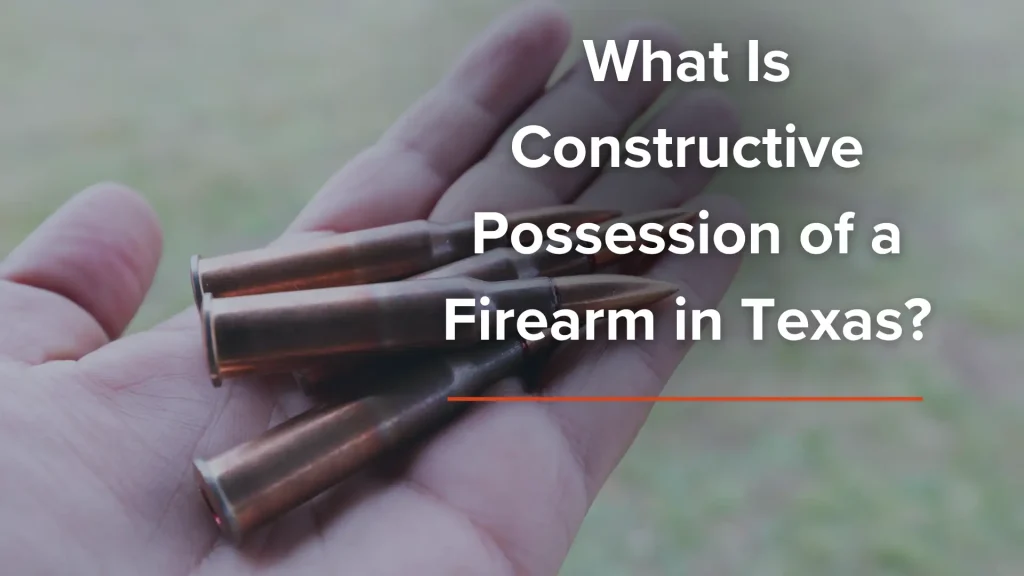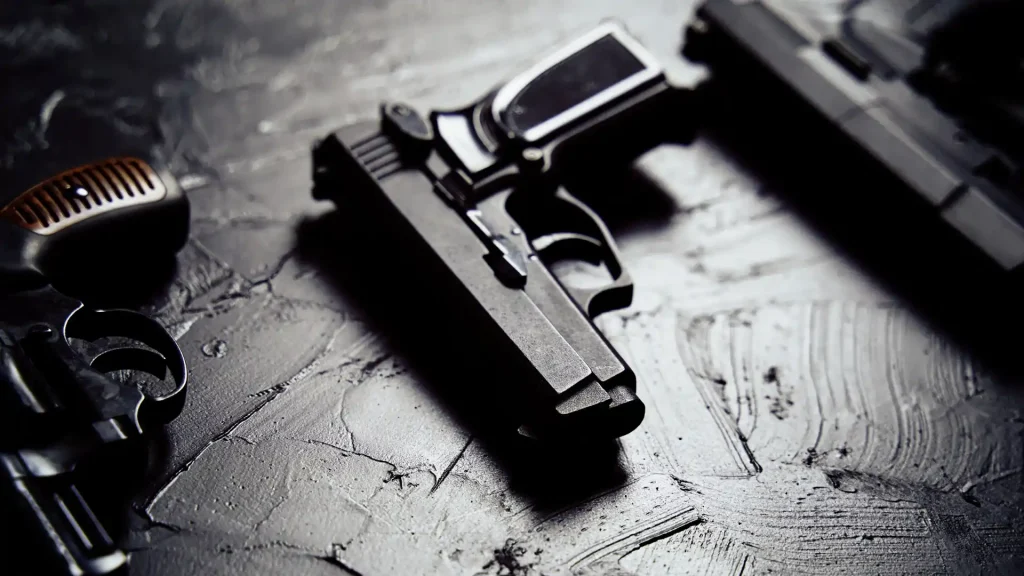
While Texas has relaxed or removed many of its restrictions concerning who can possess guns, federal laws and some state laws still prohibit certain people from having firearms or taking them to certain places. When prosecutors want to prove these charges, they must show how the defendant had actual or constructive possession of a firearm. But what is “constructive possession of a firearm,” and how can defendants fight these charges?
If you face charges related to illegally possessing a firearm in Texas, the Law Offices of Mark T. Lassiter can prepare a strong defense and protect your Second Amendment rights. Working with a Dallas gun crimes lawyer is the best step you can take to avoid the harsh penalties that come with these charges, and our firm has extensive experience with these cases. Let’s examine what “constructive possession” means in Texas gun crime cases and how to defend yourself against these charges.
Actual Possession vs. Constructive Possession
If Texas prosecutors want to convict someone of illegally possessing a firearm, there are two ways for them to prove their case. The first way is to show that the defendant had the gun in their hand when they committed the offense. For example, a police officer may have seen the defendant holding a gun when they committed the offense. This is “actual possession.”
“Constructive possession” involves proving the defendant was not holding a firearm when they committed an offense, but they had it nearby and had control of the gun. For example, if a police officer stops a driver and sees they have a gun on the passenger seat or under the front seat, that would be constructive possession. Even though the driver did not have the gun in their hand, it was within their reach and in their car, so they still “possessed” it in legal terms.
Texas Laws on Illegally Possessing a Firearm
Recent changes to Texas law generally allow people 21 and older to carry handguns in most public places without a license. However, there are still some restrictions on who can carry guns in public, places where people can bring guns, and who can own a firearm. Here are the key facts to know:
Who Can and Cannot Possess Firearms in Texas:
- Most adults aged 21 and older who are not otherwise prohibited by law (such as convicted felons) can carry handguns in public, even if they don’t have a license to carry.
- People convicted of felonies cannot possess a firearm for five years after their release from confinement or community supervision. After five years, they can only possess a firearm at their home.
- Individuals convicted of certain misdemeanors, such as domestic violence, are prohibited from possessing a firearm for five years following their release from confinement or community supervision.
Where People Can Bring Guns in Texas:
- Public places for open or concealed carry if the person is 21 years or older and not prohibited from owning a firearm.
- In their own premises or their vehicle or watercraft.
Where People Cannot Bring Guns in Texas:
- Schools, including elementary, secondary, and postsecondary institutions.
- Polling places on election day.
- Government courts or offices used by the court.
- Secured areas of airports.
- Businesses that make 51% or more of their income from alcohol sales for on-premises consumption.
- Hospitals and mental health facilities.
- Correctional facilities.
- Professional or collegiate sporting events (unless participating in the event with the firearm).
- Government meetings where notice is provided prohibiting firearms.
Types of Guns, Ammo, and Weapons Banned in Texas:
- Explosive Weapons: This includes bombs, grenades, rockets, and mines designed to cause serious injury or death, or significant property damage.
- Machine Guns: Firearms capable of shooting more than two shots automatically, without manual reloading, by a single trigger function.
- Chemical Dispensing Devices: Devices designed to dispense a substance that can cause an adverse psychological or physiological effect on a human being, except for small chemical dispensers sold commercially for personal protection.
- Zip Guns: Improvised firearms, often made from household materials, that are not originally designed to be a firearm but are adapted to expel a projectile.
- Tire Deflation Devices: Devices, such as caltrops or spike strips, designed to impede or stop the movement of a vehicle by puncturing its tires.
- Improvised Explosive Devices (IEDs)
- Armor-Piercing Ammunition
- Rifles with a barrel length of less than 16 inches.
- Shotguns with a barrel length of less than 18 inches.
- Any weapon made from a shotgun or rifle if the altered weapon has an overall length of less than 26 inches.
Penalties for Illegally Possessing a Firearm in Texas

Penalties for violating gun laws in Texas vary widely based on the type of weapon involved and the circumstances of the offense. For example, possessing prohibited weapons like machine guns, short-barrel firearms, or explosive devices is typically a third-degree felony, which can lead to 2 to 10 years in prison and fines up to $10,000. On the lower end, unlawfully carrying a firearm in a restricted area, such as a school, may result in a Class A misdemeanor, which is punishable by up to 1 year in jail and a fine of up to $4,000.
Still, a misdemeanor offense can significantly impact your future, and a felony conviction can have drastic consequences. Getting help from a capable attorney is the best step you can take to avoid the severe penalties that come with weapons offenses in Texas.
How To Beat a Constructive Possession of a Firearm Charge
While being charged with constructive possession of a firearm is harder to prove than actual possession, it’s crucial to take them seriously and prepare accordingly. Here are some strategies for how to prove the firearm was not yours:
- Challenge the Evidence: Your lawyer can argue that the prosecution lacks clear proof linking you to the firearm. In many cases, simply being near a gun isn’t enough to prove possession.
- Question Physical Evidence: If there are no fingerprints or DNA on the weapon, you can argue that you never touched the firearm.
- Shared Space Defense: If the police found the gun in a shared area, emphasize that others had access to the space, making it unclear who the gun belonged to.
- Discredit Witness Testimony: If witnesses are unreliable or their stories are inconsistent, your lawyer can challenge their credibility in court.
- Fourth Amendment Violations: If the police violated your rights during the search or seizure, your attorney can ask to have the evidence suppressed, which can weaken the prosecution’s case.
The Law Offices of Mark T. Lassiter understands the stakes in weapons possession cases and can provide the robust defense you need to protect your rights and freedom. Call (214) 845-7007 now or complete our contact form for a free consultation from our experienced attorneys. With our compassionate and understanding representation, you’ll feel better knowing we’re working tirelessly to gather evidence and build a robust defense to help you clear your name. Ask us anything about your case.








